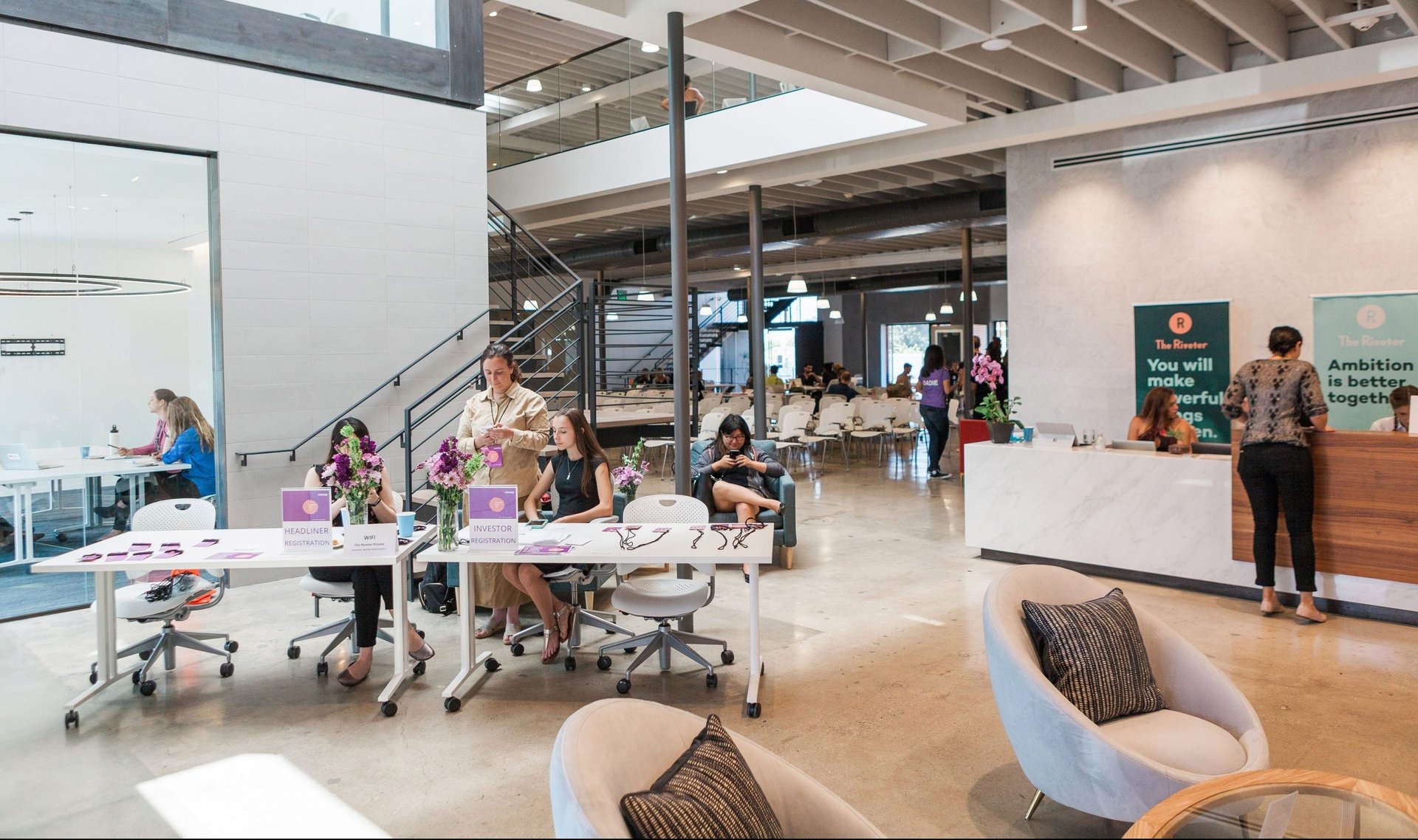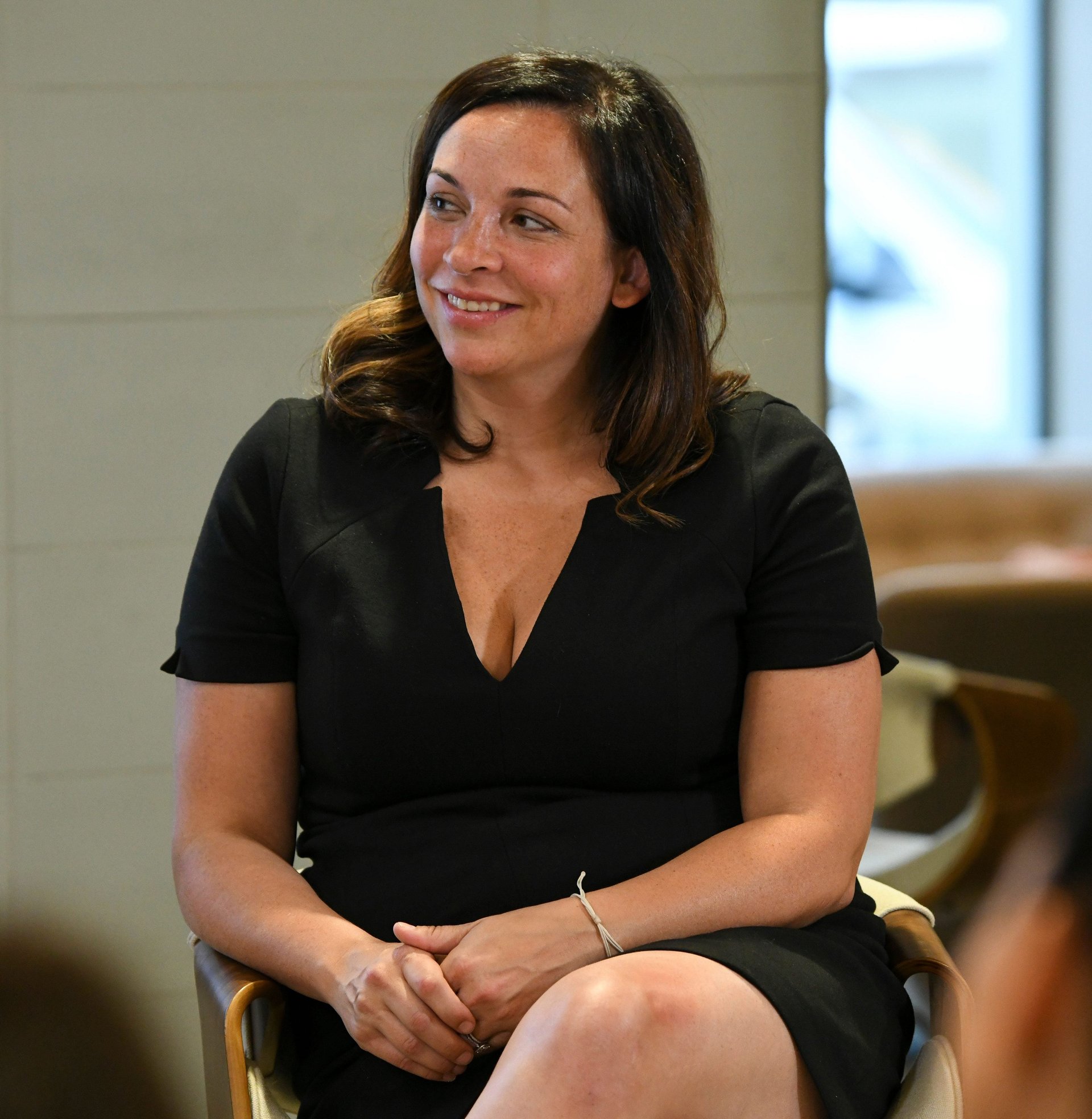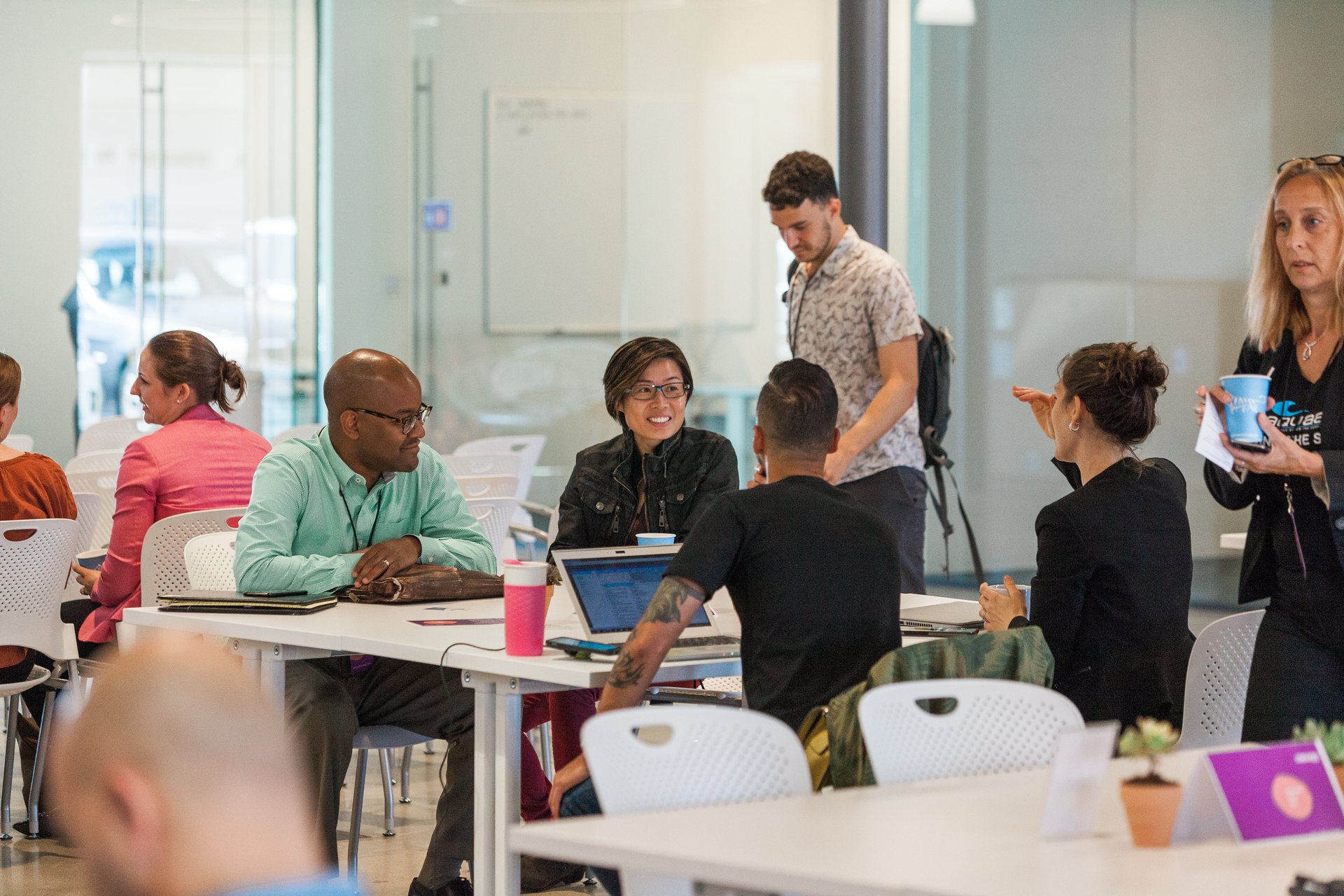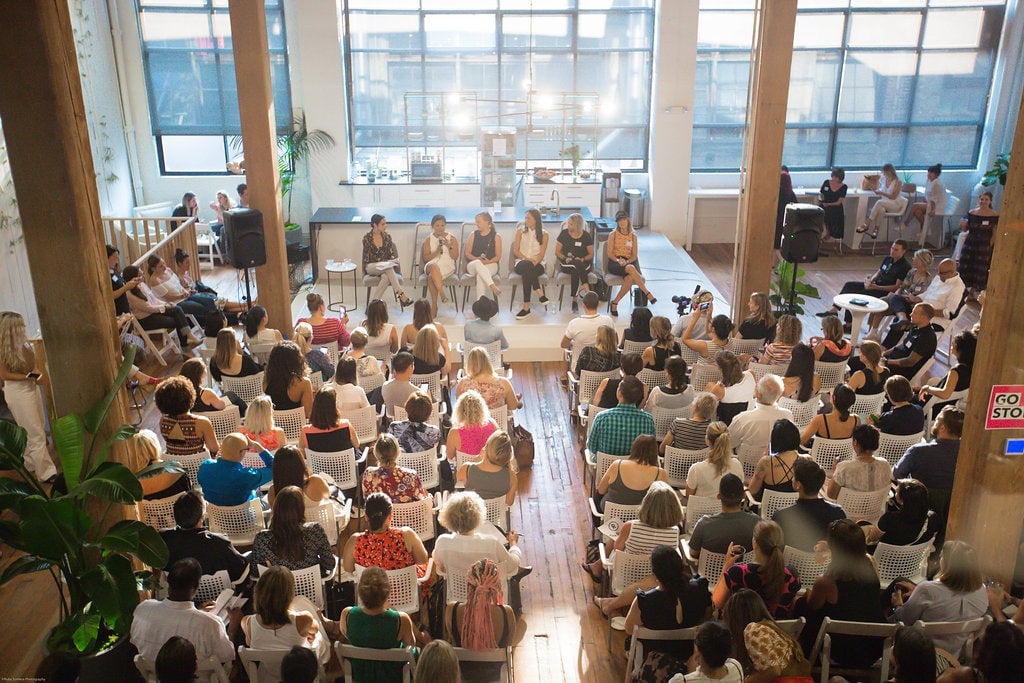If co-working is the future, then it shouldn’t look like a frat house
If the future of work is happening in co-working spaces, it leaves a lot to be desired for women.


If the future of work is happening in co-working spaces, it leaves a lot to be desired for women.
Not a single co-founder or board member at WeWork, Industrious, or Rocketspace, some of the biggest coworking companies in America, is a woman. Unsurprisingly, this means that many of these spaces feel quite white, male, and techy. “The facilities were great, but it was all a ‘Move fast and break things’ culture,” said Priya Kubar, an Indian-American entrepreneur, of her early days working in male-dominated Bay Area coworking spaces. “I believe that sustained growth is only achievable if you have a balance in life.”
Community breeds on likeness, and in this context, much like Silicon Valley, likeness means white, cis, tech bros.
Various women’s only coworking spaces have launched as alternatives to the status quo. Take The Wing, the all-women’s social and co-working club, which raised a $32 million Series B funding round in November 2017 (from WeWork) after earning its Series A of $8 million the previous April. The Wing has four locations in New York City and Washington DC, and is flocking to San Francisco, Los Angeles, Seattle, Chicago, London, and Toronto soon. Men are not allowed, ever. There’s also The Assembly, San Francisco’s alternative to The Wing, which only allows female members, though men can come as guests.
According to Amy Nelson, founder and CEO of the Seattle-based coworking company, The Riveter, neither WeWork nor The Wing-style coworking spaces were sufficient. Though she experienced frequent sexism as a lawyer and political activist, Nelson knew she couldn’t do her job without interacting with men—nor did she want to block men out of her workspace. However, once she left law to become an entrepreneur, attending business classes at WeWork, Industrious, and Galvanize in Seattle, she knew she’d never thrive in community they cultivated.
“I was going to these classes, walking into these coworking spaces, and I was like, wait a second, like if coworking is the future, then why does it still look like a frat house? Because it really did, to me,” she said.
Nelson dreamt of an alternative—a coworking space run by women, oriented toward women’s needs, but open to people of all genders. The future of equality, she believed, was women-first, but gender-equal. That alternative didn’t exist in Seattle. So, like any good entrepreneur, she made it happen. It’s called the Riveter, named after Rosie.
Today, The Riveter has five coworking locations across Seattle and Los Angeles, and they’re expanding to nine more US cities in the coming year. As part of How We’ll Win, Quartz’s year-long series on the fight for gender equality, I interviewed Nelson on her vision for the future of work. A lightly edited version of our interview is below.
Quartz: So, tell me about your personal background, and how it led to The Riveter.
Nelson: I grew up in Ohio, and I’ve always been really political; I was knocking on doors since I was a little kid with my parents. Then went to college at Emory, and after I worked abroad on anti-corruption, freedom of information, and elections in Africa and Latin America. I decided I’d go to law school because to work in an international field, it was PhD or JD. So I got my JD at NYU, thinking I’d go right back into international politics.

Then, of course, walked out with massive amounts of student debt, so I went to work at a big Wall Street law firm, working for Floyd Abrams, the first amendment lawyer who worked on the Pentagon Papers. At the same time, I got into political fundraising on Obama’s national finance committee, and co-founded Gen44, the under-40 arm of the campaign.
But in all of those arenas, I saw women and men being at the same place at the starting line, then at the finish line, they looked super different. I was never okay with it—in finance, politics or law. Women are over half of law school graduates, but we’re approximately 20% of equity-holding law firm partners. You see these inequalities every single day. Women would wait until they made partner to get pregnant. It is just nuts.
So I kept lawyering, and in 2012 I ended up in Seattle with my husband, he joined Amazon. All of these changes were happening in my career, but I was still succeeding, so I was like, well, maybe the whole gender bias thing is not real—because I’m succeeding, it’s fine—which is such bullshit.
Then you got pregnant.
Yes. When I became a mother, it was like a bomb exploded in my professional life. I was treated differently from the minute I said I was pregnant, to the minute I came back after giving birth. I was an associate at the time, but I was almost a partner. I was given different cases—I wasn’t given the exciting stuff that would be really time consuming, or travel heavy. I wasn’t even asked if I wanted it, which is bullshit, because I did a trial when I was eight months pregnant.
So I started thinking, okay well this is how it’s going to be; there’s no way I’m going to make partner, and I didn’t want to at that rate. So I went in-house, because I thought maybe in-house was the answer. That experience was horrifying.
Like many women who are mothers, I read Lean In, and tried to find some inspiration. I didn’t love the book at all, I thought it came from a place of great privilege.
But there’s this statistic in Lean In that just jumped out at me—that almost half of professional women with college degrees off-ramp after they have kids. And I was like, if that’s true, which it is, something is so broken, and we’re just not willing to admit it or do something about it. So I started thinking about what I’d do to fix this issue, because like many women, I did not want to stay at home.
I think the American narrative is like, half of women leave the workforce after giving birth because because they want to stay home with their kids and not work, which is not true.
Given these circumstances, I started thinking it would make more sense to go off on my own, professionally. And again, my story is not at all unique—women are starting businesses at five times the rate of men, which is nuts. So because I’m super type-A, I started taking classes on how to write a business plan, and how to do financial projections. And all those classes were held at WeWork, Galvanize, and these other big name coworking spaces.
Something about these coworking spaces must have sparked your interest, given you went on to create your own.
I was going to these classes, walking into these coworking spaces, and I was like, wait a second, like if coworking is the future, then why does it still look like a frat house? Because it really did, to me.
I think flexible workplaces are amazing, and places like WeWork and Galvanize are killing it, honestly. But I think that often, companies reflect who they’re founded by, and when you look at the future of work—WeWork, Industrious, Notel, RocketSpace—they’re all founded by men, run by men, and none of them have a single woman on their corporate board.
Wow, I did not know that.
Yeah, not one woman. So that’s the future of work—it’s being built by men, just like the past was.
So I started talking to women entrepreneurs in New York, San Francisco and LA, asking them, where do you go to meet women you would want to work around? Or how did you start your businesses or connect to investors? And the universal answer was there isn’t a place to go. It just didn’t exist.
Sure, they worked from home or at a coffee shop, or at a coworking space where they weren’t finding a community. There’s a reason, I think, that you see a certain type of community in a lot of the coworking spaces—usually a predominantly white, male, tech-y community—and it’s because the community built up like that. People feel comfortable, and gather around people who are like them, and that’s how community grows.
So I thought, hmm, maybe a better idea than being a child sleep consultant—which was my first business idea—is to create this space where women can work and learn skills and share resources. Coming from political fundraising, I know that your network is absolutely everything. I hate saying, “who you know is everything,” but it’s true. It’s the relationships that you build, the people who can help you open doors, and sometimes it really is just the people you know of.
I decided I would build one of these coworking spaces geared toward women, but not only for women. And I named it The Riveter, after Rosie. At first I was only planning to build one, in Seattle. Then a friend who’s a startup attorney asked me why are you building one of these? And I was like, what do you mean? And he said, why don’t you build 100? And that literally hadn’t occurred to me, and I think there’s so much to that for women, because you can’t be what you don’t see. Women aren’t getting enough VC money, and they’re building big scale companies.
He lit a spark, and from there on out, The Riveter was going to be big scale. I was still lawyering during all of this, too. But I went home, and I looked up the founders of WeWork, and looked up the founders of Industrious, and I was like well, I can do this.
I think sometimes the examples that we see of big success in tech or Silicon Valley, they seem inaccessible or unattainable. I do have fancy degrees, so I can’t ignore my privilege, but even to me, entrepreneurship didn’t seem like something anyone could do. But that’s all entrepreneurship is, right—it’s coming up with an idea, and then having a lot of hustle and just doing it.
At the time, my kids were two and six months. Then I decided that I would get pregnant again, and I was like, I’ll have the third child before scaling. What can I say, I love the efficiency. So, I quit my job in January 2017 as a lawyer, and raised a pre-seed round of $700,000 in February.
How did you do that?
Through talking to people. I just told everyone in the world I knew that I was doing it, creating this company. And in Seattle, I was at my daughter’s preschool class talking to another mom, and she was like, “Oh, you should talk to my husband, he’s a serial entrepreneur.” So I talked to him, and he invested. Then he got six other people to invest, and then I started pitching angel investors in Seattle, and got five to invest with just a PowerPoint.
How did you pitch your coworking vision as different from what already exists?
The coworking market is growing—it’s an early but proven market, and The Riveter was filling in a hole that hadn’t been filled.There were a lot of very male-dominated coworking spaces, and there were women’s only spaces popping up all around the country, like The Wing, but there wasn’t a coworking space that’s women-dominated but built for everyone.
At The Riveter, we welcome members of all genders—you don’t have to be attached to a woman in any way to be a member. Presently our membership is 25% male, and that’s not men who are all on a team with women, or anything like that. It’s men who came on their own.

How does The Riveter differ from other top coworking spaces in terms of membership?
So at WeWork and Industrious, for example, all their memberships are full-time. But we know a lot of people in the flexible work market want flexible coworking memberships.
So at The Riveter we have a second-shift, weekend membership, and a part-time membership, which is our most popular by far, and that’s 12 half days a month, or six full days. The people who do those part-time memberships are entrepreneurs who work from home most of the time, for example, but they want to have a professional place to do meetings. And having that professional space is extremely important, especially for women, so they have somewhere to bring clients, investors, journalists, you name it, and be taken seriously. Private conference rooms are available for booking, for all members, no matter what membership they have.
In addition to workspaces, what does The Riveter offer?
We also have programing, which appeals to all genders, but we intentionally try to hit on the things that are really different for women in entrepreneurship. I’m not a social scientist, and I don’t know why women get 2% of VC dollars, but I know that they do. The much more relevant fact is that women only get one in every 23 dollars in small business loans, which is relevant to way more women than VC funding. And I don’t know whether it’s chicken or egg, like maybe more women would be scaling big companies if they could get funding. So we have weekly VC hours where we have 17 different VC firms that rotate through on a weekly basis to meet with female founders.
Are VC hours open to all members?
Yes, they’re open to anybody regardless of membership type. These VCs volunteer their time. It’s mostly male VCs, because we know that implicit bias is real for all of us, regardless of our gender or our race. So, knowing that, how do you change it? One of the ways you change bias is by getting people who aren’t normally in front of one another in front of one another.
I’m not going to listen to the fact that there’s a pipeline problem with female entrepreneurs, because there’s not. So one of the things we can do is VC office hours, and we have other classes on how to do the nuts and bolts of entrepreneurship, like how to do a financial projections, pitch investors, pr101, or social media.
We also do social events. Where do you find your community, especially outside of a really dense city like New York? So we have working mothers breakfasts. We have best selling authors come, like we just had Emily Chang, author of Brotopia, who was amazing, and we had Jennifer Palmieri, who’s the former White House Director of Communications, Facebook COO Sheryl Sandberg, and Backstage Capital founder Arlan Hamilton. We’re also partnering with Microsoft for Startups, so our founders will get access to Microsoft benefits, programs, and perks for free.
The Riveter is built on a model of inclusivity; we’re built on the idea of trying to make people’s lives easier and more seamless, so our benefits are not super fancy, but they’re necessary, like on-site meditation services, and childcare partnerships.
Why do you think the men who have joined chose The Riveter?
There are men who are members of female-led teams, but the vast majority of men are solo—they have their own companies, and they like the vibe better. They’re committed to the idea of gender equality. Feminism isn’t a single gender issue, it’s a complex, multilayered issue, and there are many men who give a shit. I’m optimistic about it.
Look, the corporate America that exists today was built decades and decades ago by men who are now dead. There’s lots of work that needs to be done, and a lot of men want to do that work, so one of the things we can do is to show them what it means to work in a female-led space.

In 10 years, where do you see The Riveter?
In 10 years, I hope that we’re all across the country and all across the world, and that we’re synonymous with women and work. The reason we named it The Riveter was after Rosie, because that was the one time when women in America really defined the workforce. And the country bent to it. It was the only time in American history that the federal government subsidized child care, during World War II. We don’t hear about that enough. Everything we think is impossible is completely possible, and when we make women’s lives better, we make everyone’s lives healthier and happier.
Sometimes people ask me if the Riveter is political. Women in America are politicized by our very existence. And so to say the Riveter is not political would be a misnomer, because we absolutely are. We don’t believe in one party or the other, but we believe in equality of opportunity, and we will fight for that to the end of it. It matters to me, I am worth it. It matters to my friends. And it matters for my daughters—they shouldn’t have to put up with this shit.
You know, I sometimes think about the WeWork slogan, which is “Do what you love.” It gives me pause, because there are a lot of women who try what to do what they love. I went to law school, and I paid the same in tuition as any man. And when I was 21, I didn’t realize that I would walk out with the same amount of debt as any man, but I would never make the same on the dollar. And over the years women are less likely to get promoted than men, mothers are less likely to be promoted than non-mothers, and when the cards are that stacked against you it’s really hard to do what you love.
So, you gotta find a way. Women are incredibly resourceful, and we will do whatever it takes, and I think that’s one of the reasons why women are starting businesses five times the rate of men, because hey, if you can’t earn the same dollar why not go find a different way. And I’m really proud of women for doing that.
I don’t think that female entrepreneurship is trendy or “cool,” it’s necessity. Women have been doing entrepreneurship for decades, for centuries. Motherhood is entrepreneurship. Like look at Madam CJ Walker, who was the first African American woman to built a billion-dollar company. She’s remarkable, and history has largely forgotten about her, but she did it because she had to find a way.
And I’m really happy that there’s more of a light being shined on women entrepreneurs today, but I don’t think that means it’s “on trend.” I think that means our voices are getting louder, and when I hear that women receive 2% of VC capital, what boggles me is I know that women have more than 2% of good ideas. And what happens is that if our ideas aren’t going to market, ideas that could make women’s lives better aren’t being championed.
One of the reasons I’m proud of what we’re building at the Riveter is something Cindy Gallop, an incredible entrepreneur, she once said: “There’s a lot of money to be made taking women seriously.” I completely agree with that. And I think there are very few examples of taking women seriously in this country, and we take women very seriously.
What’s your advice for people who want to be entrepreneurs, but don’t see themselves as sufficiently qualified, or capable?
Being an entrepreneur doesn’t require a special degree. Schools are just starting to have courses in this, because being an entrepreneur is taking all the tools that you have in your tool kit, and figuring out how to use them.
I had certain tools in my tool kit from being a lawyer that were really helpful to being an entrepreneur, and I had other skills that were horrible to my growth as an entrepreneur. Like as an attorney, you have to be a perfectionist, you can’t get anything wrong. You cannot be a perfectionist as an entrepreneur. Entrepreneurship is an exercise in giving it the 70%, then saying go. If you’re doing it perfectly, you’re doing it wrong.
It’s really hard to make the pivot into entrepreneurship—but the hard part is that we convince ourselves we can’t do it. If you take that away, anybody can do it. Practically, you have to have the personal financial runway; we talk a lot about your business financial runway, but personally you have to figure it out too. Save your money, make a spreadsheet of your expenses. Treat it like you would a business balance sheet. Like how long can I go without making money? I didn’t make money for the first 13 months I was doing this full-time, then I gave myself a paycheck. But I spent a lot of time making those spreadsheets, figuring out how that would work. And I saved money to do it.
But above all, entrepreneurship is about building the relationships, asking people for help, and just doing the thing. You could spend five years listening to podcasts, or building a business plan that you’ll never look at again, but if you just do it, you know, you’ll figure it out. And as long as you have enough hustle, you can make it work.